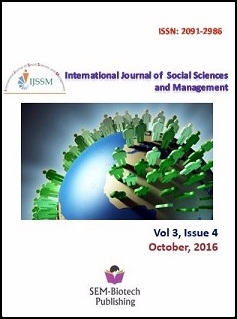Microfinance and Poverty Alleviation in Southwest Nigeria: Empirical Evidence
DOI:
https://doi.org/10.3126/ijssm.v3i4.15960Keywords:
Microfinance, Poverty alleviation, Standard of living, Finance, NigeriaAbstract
In order to alleviate poverty and improve the living standard of the people of South-West Nigeria, it is imperative that micro/small financial services such as credit, insurance, money transfer, etc. are provided in order to engage them actively in productive activities. Globally, there are several failed policies by governments, particularly in Nigeria over the years aimed at poverty alleviation. This study examines microfinance scheme towards the dispersion of credit amongst the working poor; draws from the data collected from field survey and these were reported using tables, frequency counts and cross-tabulations to draw inferences and a loan demand model was specified and estimated using the Ordinary Least Squares (OLS) econometric technique.The study used cross-sectional data collected from selected respondents in selected areas of both the Lagos and Ogun States of Nigeria respectively. The study found that majority of the Microfinance banks in Nigeria are model after the Grameen Bank which is aimed at the poor and people with basic, little or no education and that loan demand is interest rate insensitive. Therefore, MFIs should design appropriate products that are flexible enough to meet the different needs of the poor for both production and consumption purposes. Besides, governments (local, state and Federal) should urgently tackle the infrastructural gaps such as electricity, water and efficient transportation system which impact greatly on the standard of living of the people.
Int. J. Soc. Sc. Manage. Vol. 3, Issue-4: 256-266
Downloads
Downloads
Published
How to Cite
Issue
Section
License
This license enables reusers to distribute, remix, adapt, and build upon the material in any medium or format for noncommercial purposes only, and only so long as attribution is given to the creator.




